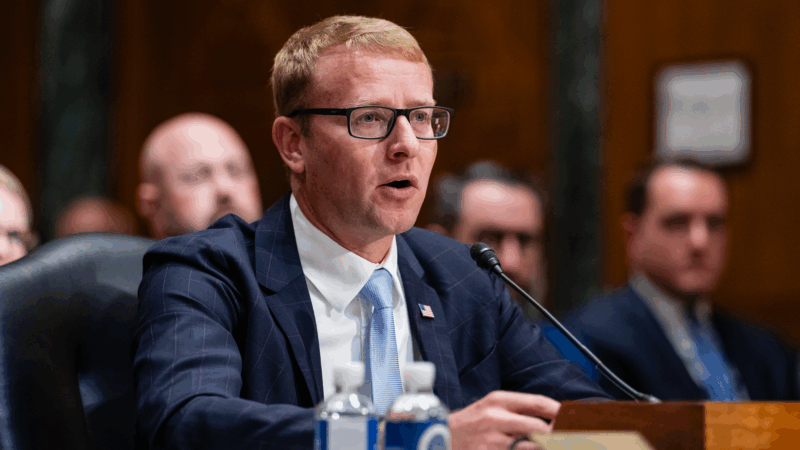Education Dept. warns schools: Eliminate DEI programs or lose funding
The Trump administration has threatened to withhold federal funds from public schools that have diversity, equity and inclusion programs.
In a letter to state leaders across the country, the U.S. Education Department said Title I funding, which is targeted to schools with a high proportion of low income students, would be threatened if schools failed to follow its interpretation of civil rights laws.
Any violation of civil rights law, it says, “including the use of Diversity, Equity, & Inclusion (‘DEI’) programs to advantage one’s race over another—is impermissible.”
School and state officials are required to sign a certification letter attached to the memo and return it to the department within 10 days, proving that they are complying with the directive.
This is the latest in a series of letters the department has issued to state and local school leaders: one focused on student privacy, another abruptly ending COVID relief funding promised to schools, and another issuing guidance on how to use federal funds to support parent choice in public education.
While Secretary of Education Linda McMahon has not clearly defined what the administration considers a violation of civil rights law, the agency issued a letter in February that notified educational institutions that they must “cease using race preferences and stereotypes as a factor in their admissions, hiring, promotion, scholarship.”
In a related document addressing frequently asked questions about how the administration would interpret Title VI of the Civil Rights Act of 1964, the agency said: “Many schools have advanced discriminatory policies and practices under the banner of ‘DEI’ initiatives.” The document went on to say that schools could engage in historical observances like Black History Month “so long as they do not engage in racial exclusion or discrimination.”
While the federal government is only responsible for about 10% of money that goes to schools, Title I is one of the largest federal grants overseen by the Education Department: In the current fiscal year, the federal government set aside more than $18.38 billion for Title I. Nearly 90% of U.S. school districts benefit from the program.
“Federal financial assistance is a privilege, not a right,” Craig Trainor, the department’s acting assistant secretary for civil rights, said in a statement. “When state education commissioners accept federal funds, they agree to abide by federal antidiscrimination requirements. Unfortunately, we have seen too many schools flout or outright violate these obligations, including by using DEI programs to discriminate against one group of Americans to favor another based on identity characteristics.”
Many educators worry that the removal of this money could have significant impacts, especially to rural and low income communities that rely heavily on federal funding.
The American Federation of Teachers, with 1.8 million members the nation’s second largest teachers union, is part of a lawsuit aimed at blocking the department’s recent civil rights guidelines.
“In the middle of a school year, the president is trying to bully the very same school districts that he insisted, just a few weeks ago, should be in charge of education,” the AFT’s president, Randi Weingarten said in a statement. “He’s wielding a cudgel of billions in federal aid to tens of millions of children, of all races and ethnicities, to force educators to kowtow to his politics and ideology.”
In the rural Lucerne Valley Unified School District in the high desert of California, Superintendent Peter Livingston says he’s still digesting the latest civil rights guidelines. He says about 90% of his district’s students are considered economically disadvantaged, and all of its schools rely on Title I.
“If the money were to be threatened, that would have a huge impact,” he says.
But he also favors the efforts to reduce the role of the Education Department in local schools, especially if it means federal dollars could be used more efficiently.
He says his district uses Title I funds to hire staff, to keep class sizes smaller and for academic programs that help “level the playing field” for students regardless of their income.
“If the regulations are in place that we have to follow,” he adds, “that’s what we’d be doing in order to ensure that we had the money to serve our students.”
Pentagon is embracing Musk’s Grok AI chatbot as it draws global outcry
Defense Secretary Pete Hegseth said Monday that Elon Musk's artificial intelligence chatbot Grok will join Google's generative AI engine in operating inside the Pentagon network, as part of a broader push to feed as much of the military's data as possible into the developing technology.
Offshore wind developer prevails in U.S. court as Trump calls wind farms ‘losers’
A federal judge ruled Monday that work on a major offshore wind farm can resume, handing the industry at least a temporary victory as President Trump seeks to shut it down.
Minnesota officials sue to block Trump’s immigration crackdown as enforcement intensifies
More than 2,000 federal immigration agents are in Minnesota, and that number is expected to increase. On Monday, an NPR reporter witnessed multiple instances where immigration agents drove around Minneapolis — and in parking lots of big box stores — and randomly questioned people about their immigration status.
In photos: A week of protests against ICE
People across the country gathered to protest against ICE over the past week.
Elon Musk’s X faces bans and investigations over nonconsensual bikini images
After the social media app's AI chatbot started generating sexualized images of women and children, two countries have blocked it and several more have launched investigations.
Trump administration tells states to end ‘orphan tax’ on foster kids
There's a growing move to end what some call "the orphan tax" and stop states from taking benefit checks from children and youth in foster care.







